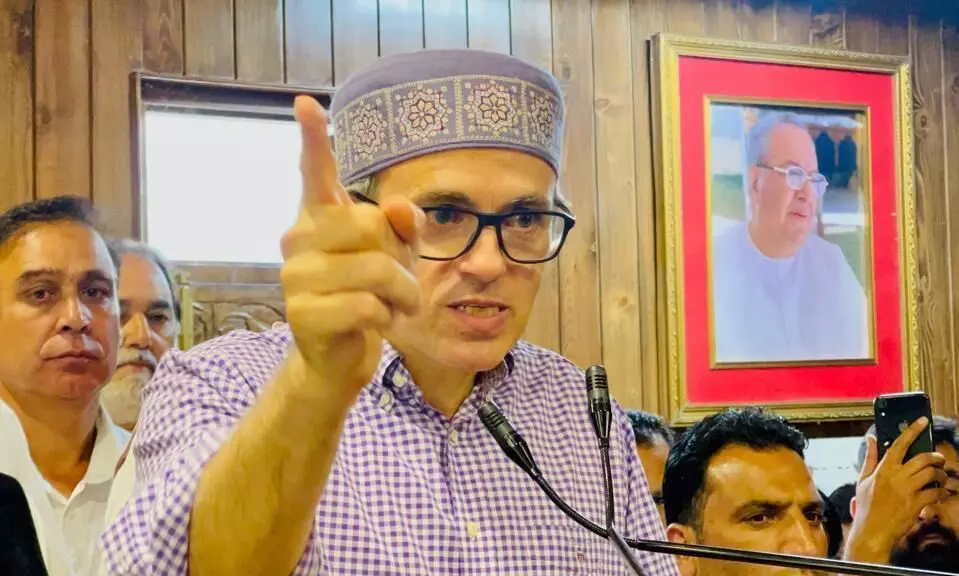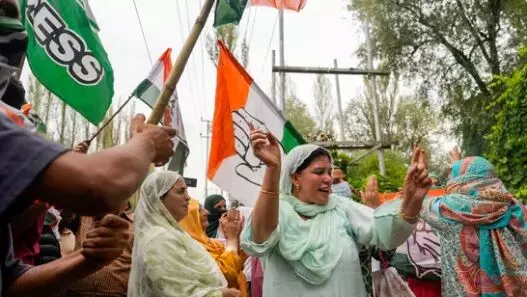
NC-Congress victory bigger than expected, smaller players fail to make impact
text_fieldsNational Conference leader Omar Abdullah (file photo)
Srinagar: Following the assembly elections since the abrogation of Article 370, Jammu and Kashmir is now set to witness an NC-Congress government, the NC-Congress combine won more than what it had expected.
However, the two alliance parties will face numerous challenges. Unlike in the past, the NC-Congress alliance has got a decisive mandate, positioning it to tackle the issues that have emerged post-abrogation of Article 370 and the subsequent changes.
The restoration of statehood is likely to be the first major challenge for the new government. The crucial question is how effectively the coalition can persuade New Delhi to restore statehood.
The election results gave a resounding victory to NC. The National Conference not only won most of the seats -35 in total out of 47- in Kashmir but also made significant inroads into Muslim-dominated areas of the Pir Panjal region in Jammu division.
The election results mark a devastating loss for the People's Democratic Party (PDP), led by Mehbooba Mufti, which has witnessed rout in it's bastion South Kashmir. PDP had emerged as the single-largest party in the 2014 elections and formed a coalition government with the Bharatiya Janata Party (BJP) until 2018. The 2024 Assembly election results represents the PDP’s worst electoral performance since its founding in 1999.
Many attribute the PDP’s defeat to lingering anger over its alliance with the BJP in 2014 and its handling of the mass unrest following the killing of militant commander Burhan Wani in 2016. Mehbooba Mufti’s controversial “toffee” remark from her time as Chief Minister continues to haunt both her and the party. Once a dominant force in south Kashmir, the PDP managed to win only two seats in this election of 16 seats in South Kashmir.
In Jammu’s Hindu-majority areas, the BJP maintained its dominance, keeping it's base intact while the Congress performed poorly in the region, securing most of its seats from the Kashmir region.
Parties like the Apni Party, led by Altaf Bukhari, and the Democratic Progressive Azad Party (DPAP), led by Ghulam Nabi Azad, both of which were formed after the abrogation of Article 370 and are often accused of being BJP proxies, failed to win a single seat in Jammu and Kashmir.
The party of Baramulla Member of Parliament Abdul Rashid Sheikh, also known as Engineer Rashid, failed to replicate the performance of his Lok Sabha election.
Despite a vigorous campaign after his release from Tihar Jail, his party secured only one seat, with his freedom failing to translate into significant electoral support.
Independent candidates, who ran in large numbers, were totally unsuccessful and had no impact on the final results. Additionally, the former banned Jamaat-e-Islami also failed to make a noticeable impact on the electoral landscape in Kashmir.
Banned Jamaat, others fails to make impact in polls
One of the factors that need special note in the elections is the bleak results for candidates from the erstwhile, now banned, Jamaat-e-Islami and other smaller parties.
Several former members of banned Jamaat-e-Islami, who contested polls for the first time in three decades, failed to make a significant impact in the Jammu and Kashmir assembly elections.
There were eight former members of the Jamaat in the fray and the group was also supporting few independent candidates in Kashmir.
Sayar Ahmed Reshi, a former Jamaat member and ex-Director of Academics at the Falah-e-Aam Trust, contested from the Kulgam seat and finished as the runner-up, securing 25,000 votes. He lost to veteran politician and CPI(M) leader M.Y. Tarigami, who won the Kulgam assembly seat for the fifth consecutive time, with over 33,000 votes.
Another candidate who finished as a runner-up was Ajaz Ahmad Mir, who contested from the Zainapora constituency. Mir, a former PDP legislator, who contested as an Independent candidate was supported by Jamaat. He lost to the National Conference's Showkat Ahmed Ganai by a margin of over 13,000 votes, securing more than 15,000 votes.
In Pulwama, former Jamaat member Dr. Talat Majeed only managed to gather around 1,800 votes. The seat was won by PDP youth leader Waheed Parra.
Dr. Kaleemullah Lone, an engineering graduate from NIT and son of Ghulam Qadir Lone, a member of Jamaat's eight-member panel that decided to re-enter the poll process, also lost in the Langate constituency of Kupwara district. He secured over 3,500 votes, while the seat was won by the brother of Member of Parliament Abdul Rashid Sheikh, who received over 25,000 votes.
A member of the Jamaat panel, currently in talks with the Centre about lifting the ban on the organization, mentioned that their inability to actively campaign hindered their performance. "There were other factors that limited our campaigning. Despite this, there were some positive outcomes, and our candidates finished as second runners-up in a few constituencies," he said.
Independent candidate Aijaz Ahmad Guroo, who is the brother of Parliament attack convict Afzal Guru, managed to win only 129 votes from North Kashmir's Sopore constituency. The Sopore seat was won by National Conference’s Irshad Kar, who polled nearly 27,000 votes.
Jailed cleric and separatist leader Sarjan Ahmad Wagay, widely known as Sarjan Barkati, who contested as Independent candidate from Ganderbal and Beerwa managed to get 438 and 12282 votes respectively.







